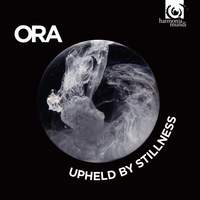Interview,
ORA - Upheld by Stillness
 ORA, a newly-formed chamber choir headed up by tireless champion of choral music Suzi Digby, bursts onto the stage with a bold project pairing Renaissance gems with specially-commissioned 'reflections' that complement them in various ways. The first volume, Upheld by Stillness, focuses on William Byrd and features new compositions by Roxanna Panufnik, Owain Park and Roderick Williams (yes, that Roderick Williams!)
ORA, a newly-formed chamber choir headed up by tireless champion of choral music Suzi Digby, bursts onto the stage with a bold project pairing Renaissance gems with specially-commissioned 'reflections' that complement them in various ways. The first volume, Upheld by Stillness, focuses on William Byrd and features new compositions by Roxanna Panufnik, Owain Park and Roderick Williams (yes, that Roderick Williams!)
Ahead of this evening's launch event at the Tower of London, I talked to Suzi about this exciting début album, where ORA came from and where they're going in the future…
The “market” for high-standard chamber choirs in England is already quite crowded; even London alone boasts a fine crop of what really have become household names among classical music fans. What sets ORA apart from the likes of Tenebrae, Polyphony, Voces8 etc?
For 25 years I have been commissioning new choral works internationally. In addition to this, I have lived and worked in Many parts of the world (Eastern Europe, Asia, South America, USA) and have been observing the remarkable dawning of a new era, a Renaissance, of choral music. This phenomenon manifests in both music-making and in composition. Choral composers in the 21st century are increasingly sure-footed in a harmonic language which communicates with power and beauty to audiences. The quality and prolific output of leading choral composers today is also enjoyed by performers and critics at the highest level.
I have often invited composers to 'reflect' existing choral music of past eras. This seems to appeal to composers and often is a catalyst to small masterpieces. So, to form a group with the ultimate musical and vocal flexibility and to commission our leading choral composers to write for them, inspired by Renaissance choral masterpieces, seemed to me to be the future. In this way, ORA can exemplify this remarkable second golden age of chamber vocal music.
The idea of commissioning a set of musical responses to pre-existing works is an innovative one – and certainly (dare I say it) adds an extra level of interest for those to whom a recording of a whole Mass setting in one sitting might not necessarily appeal. What led you to settle on Byrd for your jumping-off point?
Given that Byrd is one of the great exemplars of the Tudor era (often referred to as the Golden Age of choral music), his music is a natural choice. Byrd was such a compositional innovator at a time when English choral music was preeminent in Europe. Much of his greatest choral music was composed for the clandestine, recusant Catholic communities in England. It comes from a place of intense conviction, sometimes anguish and a deep desire to fight against prevailing political forces. This not only makes this music powerful and compelling, but also provides a powerful spring-board for programming. Modern audiences cannot fail to be drawn into the powerful, often dangerous, messages inherent in this music. And what better material for our living composers to translate their own beliefs and musical impulses. Also, there is exquisite structure, form and 'singability' in Byrd’s music. Singers love it!
Commissioning one new work is all very well, but commissioning six for one project is quite another matter! Was there much back-and-forth between the composers and the ensemble during the process of putting the album together?
Over the past 25 years of commissioning choral composers, I have learnt that the best environment for this relationship is one of trust. Interfering too much can be inhibiting and giving an insufficient brief is also unlikely to help. What is key is to give enough of a trigger to the imagination; a clear idea of the potential of the performing group and a sense that the work will sit alongside others of comparable quality. Often composers will send a first draft for comment/suggestions. We have not yet needed to suggest modifications! The secret is match the potential of the composer with the commission brief (in this case, the original Renaissance piece to 'reflect'). We ask the composers to write a reflection of the same length as the original. Other than that, they are free to choose new text; keep the same text; use fragments of the text and score for anything from unison to 18 parts. They also need to sequence the key or the original.
Your accompanying notes make it clear that this album is intended to be the first of several similarly-conceived collections; can you reveal anything about which composers (both contemporary and Renaissance) might be appearing in future instalments?
For the 250th anniversary of Tallis's epic Spem in Alium, we have commissioned James MacMillan (considered by some to be the greatest living choral composer) to write a 40-part reflection. This happens to be in 2020: a fortuitous number!
Other forthcoming pairings include...
Ēriks Ešenvalds - Infelix Ego (paired with Byrd’s setting of the same text)
John Barber - Sicut Lilium (with Brumel’s setting)
Jonathan Dove - Vadam et circuibo (with Victoria’s setting)
Ken Burton - Loquebantur (with Tallis’ setting)
Richard Allain - Videte Miraculum (with Tallis’ setting)
Frank Ferko - If Ye Love Me (with Tallis’ setting)
Harry Escott - O Light of Light (with Tallis’ setting of O Nata Lux)
Alec Roth - Night Song (with Tallis’ setting of Te Lucis Ante Terminum)
and a new setting of Psalm 150 to Archbishop Parker’s words in his Psalter, to accompany Tallis’ Tunes for Archbishop Parker’s Psalter.
You’ve obviously made it your mission to promote the writing and performance of new choral music. This is perhaps a rather broad (not to mention clichéd) question, but what challenges do you think choral music-making faces in the UK today?
The word 'choir' is not helpful in promoting high quality vocal ensembles. The sector is somewhat saturated and 'suffers', if you like, from the perception of being: 1. mainly sacred 2. lower cost for presenters than other performers. Presenters separate out choral presentations and may place them in churches or more minor venues. Festivals are under pressure to put on big names to attract potentially diminishing audiences, and their sponsors and funders will pressure them in turn to go 'populist'.
In terms of ORA, we are looking to find a 'space' which does not categorise itself under the 'choral' banner. A space which is unique. Our performances will be 'immersive' experiences for the audiences. They will be programmed imaginatively around concepts and themes which pique the interest of audiences beyond the 'choral faithful'. This means facing the challenges of ground-breaking (but not bank-breaking) production values, good publicity and breaking into new non-specialist audiences. All this is potentially costly, which brings us to another major challenge: making the 'product' affordable and financially robust whilst preserving the ultimate in quality.
Upheld by Stillness is released this Friday on Harmonia Mundi.
Available Formats: MP3, FLAC, Hi-Res FLAC



